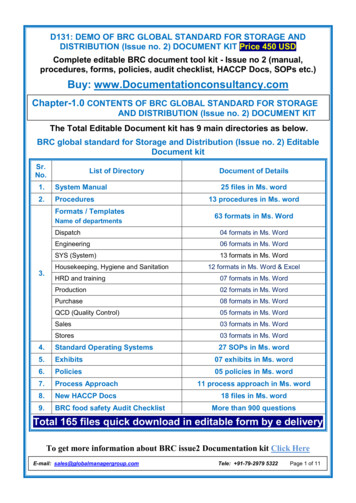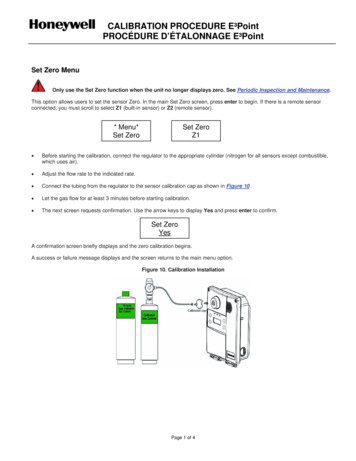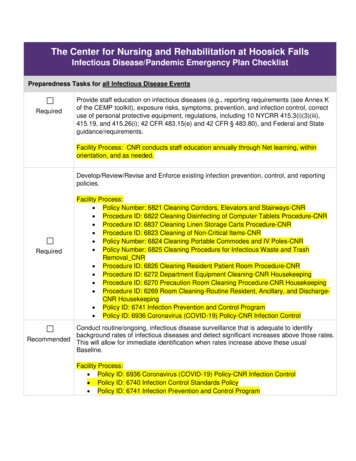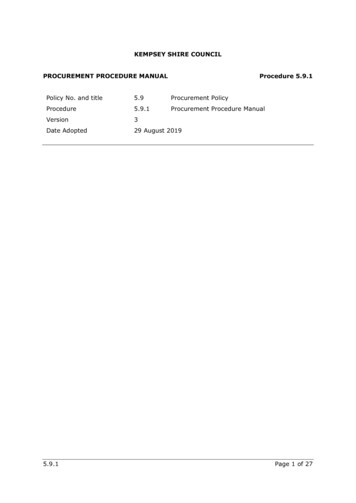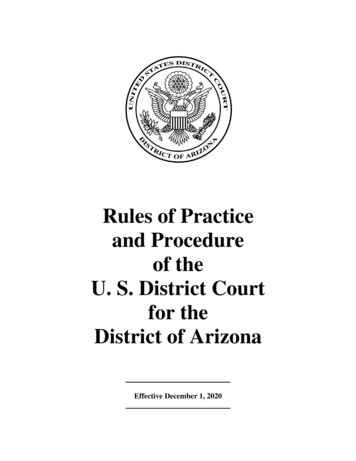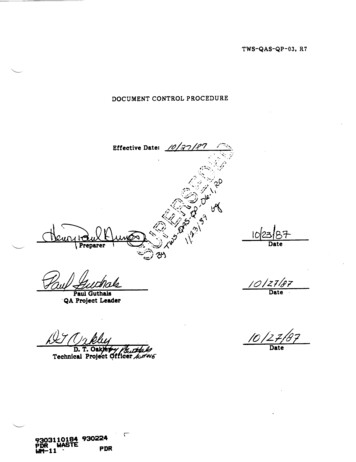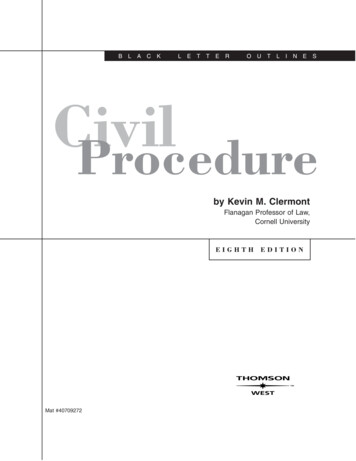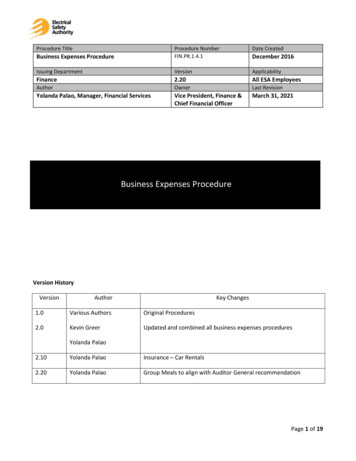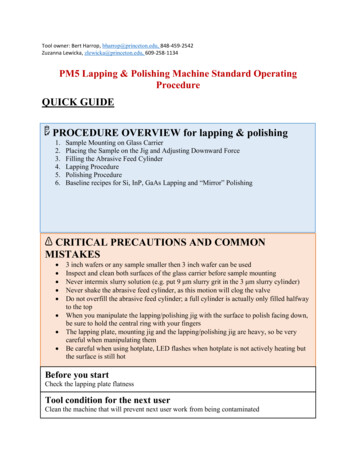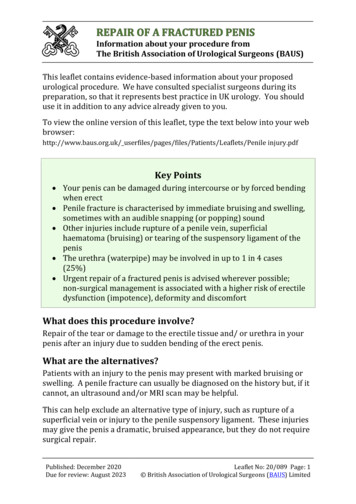
Transcription
Information about your procedure fromThe British Association of Urological Surgeons (BAUS)This leaflet contains evidence-based information about your proposedurological procedure. We have consulted specialist surgeons during itspreparation, so that it represents best practice in UK urology. You shoulduse it in addition to any advice already given to you.To view the online version of this leaflet, type the text below into your webbrowser:http://www.baus.org.uk/ userfiles/pages/files/Patients/Leaflets/Penile injury.pdfKey Points Your penis can be damaged during intercourse or by forced bendingwhen erect Penile fracture is characterised by immediate bruising and swelling,sometimes with an audible snapping (or popping) sound Other injuries include rupture of a penile vein, superficialhaematoma (bruising) or tearing of the suspensory ligament of thepenis The urethra (waterpipe) may be involved in up to 1 in 4 cases(25%) Urgent repair of a fractured penis is advised wherever possible;non-surgical management is associated with a higher risk of erectiledysfunction (impotence), deformity and discomfortWhat does this procedure involve?Repair of the tear or damage to the erectile tissue and/ or urethra in yourpenis after an injury due to sudden bending of the erect penis.What are the alternatives?Patients with an injury to the penis may present with marked bruising orswelling. A penile fracture can usually be diagnosed on the history but, if itcannot, an ultrasound and/or MRI scan may be helpful.This can help exclude an alternative type of injury, such as rupture of asuperficial vein or injury to the penile suspensory ligament. These injuriesmay give the penis a dramatic, bruised appearance, but they do not requiresurgical repair.Published: December 2020Due for review: August 2023Leaflet No: 20/089 Page: 1 British Association of Urological Surgeons (BAUS) Limited
Non-surgical treatment (often withice packs and compression) has ahigher risk of erectile dysfunction(impotence) and deformity, sosurgical repair is usuallyrecommended when the patientpresents within a week of the injury.What happens on the day ofthe procedure?Your urologist (or a member of their team) will discuss the surgery withyou to confirm your consent.An anaesthetist will see you to discuss the options of a general anaestheticor spinal anaesthetic. The anaesthetist will also discuss pain relief after theprocedure with you.We usually provide you with a pair of TED stockings to wear, and give you aheparin injection to thin your blood. These help to prevent blood clots fromdeveloping and passing into your lungs. Your medical team will decidewhether you need to continue these after you go home.Details of the procedureThe actual procedure performed will depend on the type and location of theinjury. we normally use a full general anaesthetic together with localanaesthetic blocks to your penis to provide post-operative pain relief. you may be given an injection of antibiotics before the procedure,after you have been checked carefully for any allergies we expose the site of injury either by de-gloving your penis (rollingthe skin back after making a circular incision below the head of thepenis) or through a small incision closer to the site of the injury (onthe underside of your penis) if your penis is “de-gloved”, you usually need to be circumcised we repair the injury with stitches under the skin if the urethra (waterpipe) has been injured, we will repair it withstitches at the same time we often leave a catheter in your bladder for 48 hours; if your urethraneeds repair, we will leave the catheter for up to two weeks we close the skin with absorbable stitches with normally disappearwithin two to three weeksPublished: December 2020Due for review: August 2023Leaflet No: 20/089 Page: 2 British Association of Urological Surgeons (BAUS) Limited
Are there any after-effects?The possible after-effects and your risk of getting them are shown below.Some are self-limiting or reversible, but others are not. We have not listedvery rare after-effects (occurring in less than 1 in 250 patients) individually.The impact of these after-effects can vary a lot from patient to patient; youshould ask your surgeon’s advice about the risks and their impact on you asan individual:After-effectRiskSome shortening of your penis due tofibrosis and scarringBetween 1 in 2 &1 in 10 patientsTemporary swelling and bruising of yourpenis and scrotum lasting several daysBetween 1 in 2 &1 in 10 patientsStitches under the skin of your penis whichyou may be able to feelBetween 1 in 2 &1 in 10 patientsCircumcision is often required as part of theprocedureBetween 1 in 2 &1 in 10 patientsDissatisfaction with the cosmetic orfunctional resultBetween 1 in 10 &1 in 50 patientsNerve injury with temporary or permanentnumbness of your penisBetween 1 in 10 &1 in 50 patientsDifficulty in getting or maintaining yourerection (impotence)Between 1 in 10 &1 in 50 patientsAnaesthetic or cardiovascular problemspossibly requiring intensive care (includingchest infection, pulmonary embolus, stroke,deep vein thrombosis, heart attack anddeath)Between 1 in 50 &1 in 250 patients(your anaesthetistcan estimate yourindividual risk)Published: December 2020Due for review: August 2023Leaflet No: 20/089 Page: 3 British Association of Urological Surgeons (BAUS) Limited
Significant bleeding or infection requiringfurther treatmentBetween 1 in 10 &1 in 50 patientsWhat is my risk of a hospital-acquired infection?Your risk of getting an infection in hospital is between 4 & 6%; this includesgetting MRSA or a Clostridium difficile bowel infection. This figure is higherif you are in a “high-risk” group of patients such as patients who have had: long-term drainage tubes (e.g. catheters);bladder removal;long hospital stays; ormultiple hospital admissions.What can I expect when I get home? you will get some swelling and bruising of your penis and scrotumwhich may last several days you should start to get normal erections within a few days you must avoid any sexual activity (intercourse or masturbation) forsix weeks you will usually be given some supportive underwear to reduce theswelling simple painkillers such as paracetamol will help ease your discomfortalthough you may need stronger painkillers for the first few days you may be discharged with a catheter in your bladder if you do have a catheter, we will show you how to manage it at home you will be given advice about your recovery at home you will be given a copy of your discharge summary and a copy willalso be sent to your GP any antibiotics or other tablets you may need will be discussed your stitches will usually disappear after two to three weeks but maysometimes take a littlelonger a follow-up appointment will be made for you to have your dressingsand your catheter (if present) to be removed you may require an additional follow-up, possibly with X-rays, if therewas an injury to your urethra (waterpipe)General information about surgical proceduresBefore your procedurePlease tell a member of the medical team if you have:Published: December 2020Due for review: August 2023Leaflet No: 20/089 Page: 4 British Association of Urological Surgeons (BAUS) Limited
an implanted foreign body (stent, joint replacement, pacemaker,heart valve, blood vessel graft); a regular prescription for a blood thinning agent (e.;g. warfarin,aspirin, clopidogrel, rivaroxaban, dabigatran); a present or previous MRSA infection; or a high risk of variant-CJD (e.g. if you have had a corneal transplant, aneurosurgical dural transplant or human growth hormonetreatment).Questions you may wish to askIf you wish to learn more about what will happen, you can find a list ofsuggested questions called "Having An Operation" on the website of theRoyal College of Surgeons of England. You may also wish to ask yoursurgeon for his/her personal results and experience with this procedure.Before you go homeWe will tell you how the procedure went and you should: make sure you understand what has been done;ask the surgeon if everything went as planned;let the staff know if you have any discomfort;ask what you can (and cannot) do at home;make sure you know what happens next; andask when you can return to normal activities.We will give you advice about what to look out for when you get home.Your surgeon or nurse will also give you details of who to contact, and howto contact them, in the event of problems.Smoking and surgeryIdeally, we would prefer you to stop smoking before any procedure.Smoking can worsen some urological conditions and makes complicationsmore likely after surgery. For advice on stopping, you can: contact your GP; access your local NHS Smoking Help Online; or ring the free NHS Smoking Helpline on 0300 123 1044.Driving after surgeryIt is your responsibility to make sure you are fit to drive after any surgicalprocedure. You only need to contact the DVLA if your ability to drive islikely to be affected for more than three months. If it is, you should checkwith your insurance company before driving again.Published: December 2020Due for review: August 2023Leaflet No: 20/089 Page: 5 British Association of Urological Surgeons (BAUS) Limited
What should I do with this information?Thank you for taking the trouble to read this information. Please let yoururologist (or specialist nurse) know if you would like to have a copy foryour own records. If you wish, the medical or nursing staff can also arrangeto file a copy in your hospital notes.What sources have we used to prepare this leaflet?This leaflet uses information from consensus panels and other evidencebased sources including: the Department of Health (England); the Cochrane Collaboration; and the National Institute for Health and Care Excellence (NICE).It also follows style guidelines from: the Royal National Institute for Blind People (RNIB);the Information Standard;the Patient Information Forum; andthe Plain English Campaign.DisclaimerWe have made every effort to give accurate information but there may stillbe errors or omissions in this leaflet. BAUS cannot accept responsibility forany loss from action taken (or not taken) as a result of this information.PLEASE NOTEThe staff at BAUS are not medically trained, and are unable to answerquestions about the information provided in this leaflet. If you do haveany questions, you should contact your urologist, specialist nurse or GP.Published: December 2020Due for review: August 2023Leaflet No: 20/089 Page: 6 British Association of Urological Surgeons (BAUS) Limited
Penile fracture is characterised by immediate bruising and swelling, sometimes with an audible snapping (or popping) sound Other injuries include rupture of a penile vein, superficial haematoma (bruising) or tearing of the suspensory ligament of the penis The urethra (waterpipe) may be involved in up to 1 in 4 cases (25%)
